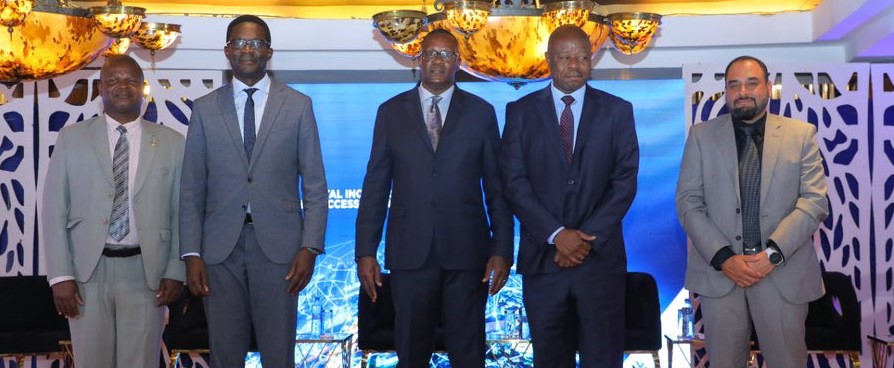ICT Week Stirs Dialogue on Digital Inclusion As ICT CS Owalo Says Low Cost Phones On The Way
Stakeholders in the ICT sector have lent their voices on strategies that need to be considered to confront challenges hindering digital inclusion in the country.
During the ICT Week hosted by the Authority between 18th and 19th May, over 500 stakeholders across the sector discussed a raft of issues that are at the centre of efforts to ensure no one is left behind the digital transformation journey.
Information, Communications and the Digital Economy Cabinet Secretary Mr. Eliud Owalo said the Government was alive to the question of affordability of devices as major hindrance to citizens leveraging the full potential that ICTs present.
He said the Government was engaging various stakeholders in the manufacturing sector that will see the assembling of low-cost mobile in the country that could cost between 40-50 US dollars. ‘‘We have actively engaged diverse stakeholders in the ICT and manufacturing sectors on the prospects of producing low-cost smartphones and lowering data costs,’’ he said.
Through its digital transformation agenda, the Government’ seeks to deploy 100,00 kilometres of fibre to enhance access to broadband, 25,000 WIFI hotspots and 1, 450 ICT hubs in every ward across the country.
CA Director General Mr. Ezra Chiloba noted that that despite significant progress made in enhancing connectivity and access to ICTs across the country, a critical portion of the citizens is still unable to reap the benefits of digital transformation.
‘‘The core question would be, how do we make sure that each and every citizen in the country, regardless of who they are and where they are, reaps the benefits of digital transformation?’’ He posed.
Through the Universal Service Fund (USF), he Authority has implemented various interventions to avail connectivity across the country, recent one being supporting the deployment of last mile fibre connectivity to 19 Counties at a cost of KSh. 5 billion.
The ICT Week saw active discussions on a broad range of issues around strategies to enhance digital inclusion in the country. The key issues that dominated discussions were how to narrow the digital divide, enhance affordability and accessibility of ICT devices, cyber security and data protection, promotion of digital skills, inclusive ICTs and courier services for vulnerable populations and entrepreneurship in the ICT sector.
Themed, Digital inclusion: Enhancing access to and usage of ICTs for all, the ICT Week witnessed incisive discussions on the challenges and opportunities in the sector and what must be done to foster an all-inclusive digital society.
On the efforts to narrow the digital divide, some of the salient issues that dominated discussions include inadequate last mile connectivity and supporting infrastructure in underserved and underserved areas, high costs of data and Internet services, low literacy rates and unrealizable power supply.
The event also featured ongoing regulatory and legal reforms that will enhance digital inclusion. With increased connectivity, the challenges of cyber security abound, with increased cyber threats and breaches, and the need to sensitize the public on cyber security and data protection.
The place of public-private partnerships was another thematic area where it was clear that lack of alignment of priorities and interests between the two sectors, lack of adequate financial incentives for private sector participation and lack of a clear framework to evaluate and manage partnerships. Accessibility and affordability of ICT devices is a critical consideration in attainment of digital inclusion.
Some of the pertinent issues that were raised at the ICT Week on this issue include high costs of purchase and repair of ICT devices, limited availability f low-cost, quality devices, impact of e-waste to the environment, and for the Authority to consider reviving the 1555 genuine device verification service to help weed out counterfeit devices.
The role of ICTs in innovation and entrepreneurship and the state of start-ups in the country was canvassed at length with limited access to funding and venture capital for start-ups, lack of mentorship and support networks for entrepreneurs and skills gaps in the workforce and inclusion of persons abled differently in innovations in the sector stood out as key issues of concern.
In order to promote digital skills for effective participation in the digital economy, participants cited the insufficient digital educational and training programmes, rapidly evolving technology, limited access to quality education and mismatch between skills taught and those required by the digital economy and limited internship programmes to encourage digital skilling.
On the question of promoting inclusive ICT and courier services for vulnerable populations, it was evident from the discussions that ICT accessibility for individuals abled differently is still a major challenge, as is limited awareness or understanding of ICTs and courier services among the vulnerable groups.
Other critical issues are affordability of services and devices, absence of tailor-made services to cater for needs of these populations and lack of formal courier-related capacity building-building programmes.

